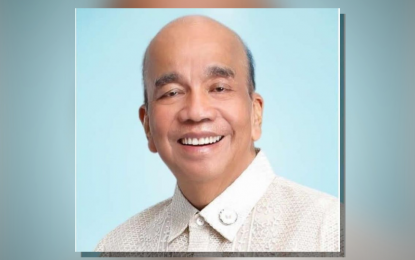
Cavite Representative Elpidio Barzaga Jr. (File photo)
MANILA – Cavite Representative Elpidio Barzaga Jr. on Thursday urged that the constitutional convention (con-con) to be composed of a combination of delegates elected by the public and experts who are appointed and vetted by Malacañang and Congress.
The Cavite solon took the idea from the earlier proposal of former Supreme Court Chief Justice Reynato Puno suggesting for a “hybrid” con-con with delegates not exclusively limited to those elected by the public.
Barzaga proposed to the House Committee on Constitutional amendments to initially anchor its substitute bill on Charter change on this “hybrid model” of con-con espoused by the retired chief magistrate.
“While acknowledging that electing delegates to a Con-con remains the best mode to amend the Constitution, Puno does not want Congress to take the traditional route where all the delegates are directly elected by the people,” he said.
Earlier, Puno proposed that the House Committee on Constitutional amendments chaired by Rep. Rufus Rodriguez adopt a hybrid setup “given the seeming deterioration of our political processes,” stressing that “there is the lurking danger that the elected delegates to a constitutional convention will just be proxies of political dynasties and economic oligarchs.”
"I will be proposing an amendment during the committee deliberation of the consolidated bills and if not approved in the committee level, I am reserving my right to propose such amendment during the plenary discussions (on the Con-con) bill," Barzaga said in a letter he sent to Rodriguez on Wednesday.
The retired magistrate, who led a consultative committee in 2018 tasked to craft a proposed federal constitution, suggested that under the hybrid model, the con-con will be a combination of delegates jointly elected by the public and experts appointed and vetted by Malacañang and Congress.
"As we have heard in the course of the public hearings in Congress, there is an apprehension by some resource persons that in a Constitutional convention, the delegates, in most instances, will be backed by politicians and the delegates would just be considered as alter-ego and in the words of former Chief Justice Reynato Puno, 'proxies of proxies or factotums of political dynasties and economic oligarchs,'” Barzaga said.
Practically, the senior lawmaker from Cavite is proposing that the con-con be composed of 51 delegates with three delegates elected per region and 40 delegates to be appointed by a committee composed of the President, the Vice President, the Chief Justice, the Senate President and the Speaker "who shall elect among themselves the one who shall be the chairman of the committee on appointments."
"The appointees shall be of good moral character with known probity and considered as experts in their respective fields particularly in health, agriculture, transportation, information technology, disaster resilience, economics, foreign investments, environment, labor, infrastructure, and law; and such other experts in other fields as may be determined by the committee on appointments and the various sectors in our community should be properly represented by at least one appointee for every sector namely: indigenous people, senior citizens, persons with disability, solo parents, LGBTQIA+, women, youth and other sectors which the appointing authority may consider necessary," said Barzaga's proposed amendment.
According to Barzaga, there will be no violation of the Constitution with the use of the hybrid setup.
Article 17, Section 3 of the Constitution states that "Congress may, by a vote of two-thirds of all its members, call a Constitutional convention, or by a majority vote of all its members, submit to the electorate the question of calling such a convention.”
Barzaga contended that this constitutional provision does not specify how delegates to a constitutional convention should be chosen, noting in past conventions, "the legislation calling for the convention specified how the delegates would be chosen."
"In 1971, under an earlier Constitution, Republic Act No. 6132 provided that delegates to a Constitutional convention would be elected by the national legislative district in a special election. The 48 members of the Constitutional Commission which drafted the 1987 Constitution were not elected by the people and were appointed by the President at that time, (by then) Cory (Corazon) Aquino," he said. (PNA)
